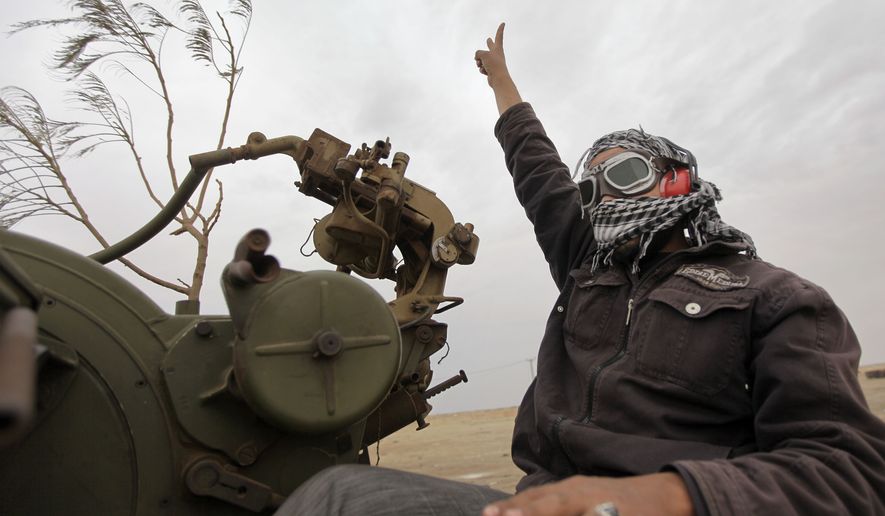Dismissing concerns over possible links between Libyan rebels and al Qaeda, the Obama administration has notified Congress it is providing $25 million in nonlethal aid to the rebels’ effort to drive Col. Moammar Gadhafi’s regime from power.
“The president’s proposed actions would provide urgently needed nonlethal assistance to support efforts to protect civilians and civilian-populated areas under threat of attack in Libya,” said Joseph E. Macmanus, acting assistant secretary of state for legislative affairs, in an April 15 letter. A copy of the letter, sent to the Senate Foreign Relations Committee, was obtained by The Washington Times.
The new authorization for assistance would cover “vehicles, fuel trucks and fuel bladders, ambulances, medical equipment, protective vests, binoculars, and non-secure radios,” according to a memorandum attached to the letter.
The letter was disclosed as Britain announced it would be sending military trainers and advisers to Libya to help organize opposition troops. The European Union also said it would send an armed force to Libya to protect deliveries of humanitarian aid.
President Obama has said that Col. Gadhafi must step down from power, but he also stated that the United States does not support a policy of regime change in Libya.
Reports last month, confirmed by The Times, stated that the CIA was providing covert assistance to elements of the Transitional National Council (TNC), the political arm of the Libyan rebels.
Questions have emerged in recent weeks about the connection between some of the Libyan opposition and the al Qaeda terrorist group. Noman Benotman, a former leader of the Libyan Islamic Fighting Group, said in an interview last month that about 1,000 freelance jihadists are at large in Libya.
The State Department memorandum attached to the letter, however, stated that the United States finds the TNC to be committed to democratic reforms.
“The U.S. government has been in communication with the TNC in an effort to build a working relationship and to understand its security capabilities and shortfalls, while recognizing the key role that Libyan opposition forces play in the protection of civilians and civilian populated areas in Libya,” the memo said.
The memo also stated that “the TNC has publicly rejected terrorism, embraced the Geneva Conventions, and emphasized its dedication to building democratic institutions to provide for a secular future in which a broad range of Libyan citizens will be able to participate.”
The letter notified Congress that the administration authorized “any U.S. government agency to provide assistance to support efforts by Libyan groups such as the TNC to protect civilians and civilian-populated areas under threat of attack in Libya.”
The letter does not say how that assistance will be delivered or whether U.S. troops would be involved.
A Senate aide who asked not to be identified by name said the nonlethal assistance could open the door to future U.S. arms and other military assistance to the TNC.
“The justification in the letter appears to claim the TNC is stable, democratic and adhering to the Geneva Conventions,” the aide said. “If all of this is true, then why can’t you provide lethal military assistance as well?”
Danielle Pletka, the vice president for foreign and defense policy studies at the American Enterprise Institute, said she is concerned by the aid.
“It would be great if they made a decision to support the rebels and to help to oust decisively Gadhafi from power,” she said. “But I worry this is a lot like the decision to work through NATO, which is rhetorical commitment without any effective strategy about what to do to actually achieve the goals the president of the United States laid out.”
In other developments, deployment of an EU armed force to Libya to protect aid shipments could take place within days, said Michael Mann, a spokesman for EU foreign policy chief Catherine Ashton.
The European Union’s 27 states approved a “concept of operations” that directs several proposed courses of action, Mr. Mann said.
In London, British Foreign Secretary William Hague said Britain will send a team of up to 20 senior military advisers to the rebel-held city of Benghazi to help organize the opposition forces.
Mr. Hague insisted the advisers would not be involved in supplying weapons to the rebels or in assisting their attacks on Col. Gadhafi’s forces.
The advisers will work with British diplomats who are in contact with the National Transitional Council, the political wing of the rebel movement officially recognized by Italy, France and Qatar.
This article is based in part on wire service reports.
• Eli Lake can be reached at elake@washingtontimes.com.




Please read our comment policy before commenting.